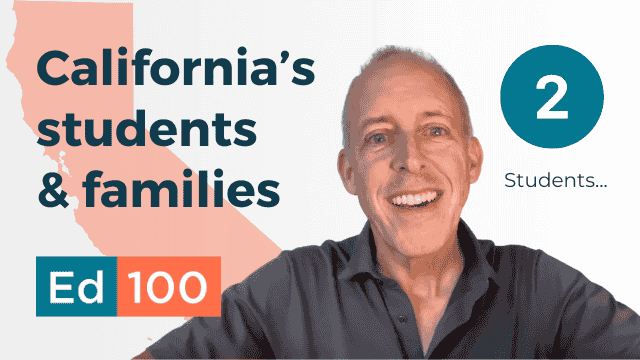
Students have an important role to play in their own educational destiny. Learning can be a tough climb, though. What motivates students to learn and succeed?
In This Lesson

What motivates students to learn?
Do incentives help students learn?
Does a student's attitude toward learning matter?
What is a fixed mindset?
What are students interested in?
Why are students' relationships important?
How did COVID-19 influence students' motivation?
▶ Watch the video summary
★ Discussion Guide.
Children can get excited about learning for all kinds of great reasons. But learning involves effort, and the world is full of things that want attention. Great teachers are masters at making learning engaging and relevant, especially when supported by compelling curricular materials.
Intrinsic and extrinsic motivation
Broadly, there are two main approaches to motivating students to learn: get them interested… or get them to do it anyway. Researchers have written much about the differences between intrinsic and extrinsic motivation in education.
Intrinsic motivation comes from within. When a student is fascinated with a subject, motivation to learn about it happens naturally. Children who memorize baseball statistics are not doing so because they will be tested on it. Education researcher Sugata Mitra has documented some of the amazing accomplishments made by children in India who band together to learn subjects that interest them.
There are two main approaches to making students motivated to learn: get them interested, or get them to do it anyway
Extrinsic motivation (which comes from without) is always second-best, but it is also important. The classic extrinsic motivator in school is the letter grade: Never mind if it’s interesting, do your homework! Parent bribes fit in the same category.
Sometimes, extrinsic motivators can help a student fake-it-'til-they-make-it. They overcome a student's initial reluctance to try an activity in order to give them a chance to take pleasure in learning it.
Extrinsic motivators can also establish and maintain community norms. For example, KIPP, a charter school network, developed a system of extrinsic rewards called paychecks to set and reinforce clear expectations for student behavior. Many educators have adopted exit tickets, a related approach, to encourage or enforce participation.
Daniel H. Pink's book Drive summarizes research about motivation, and makes a persuasive argument about the risks of relying heavily on extrinsic motivation. Though originally intended for a business audience, his work has found significant readership in the education sector. Prior to Pink's book, the most notable work in this vein was Punished by Rewards, by Alfie Kohn.
Of course, just being interested in a subject doesn't mean a student will learn it. Motivation that gets you started can be different from the complex factors that keep you going.
Not yet
Carol Dweck describes student motivation in education as a matter of mindset. When students believe that they can learn anything with effort, they can sustain their attention and energy, and accomplish amazing things. Dweck calls this a growth mindset.
On the other hand, if a student believes that their capacity to learn is fixed, they limit themselves. Statements like "I'm bad at math" or "I'm not a good student" have a way of making themselves true. Dweck points to evidence that teachers and parents can influence students' mindsets by changing the way that they present challenges.
What interests students?
There is ample evidence that participation in sports and the arts engages young people in their schools, motivates them to do better academically, and teaches them important life skills.
One reform effort that has shown success at motivating high school students is linked learning. This approach blends rigorous academics with technical education to prepare students for college and career. Evaluations have shown students in these programs have improved skills in communication and collaboration, as well as being more likely to graduate.
As discussed in the Ed100 lesson on education technology, schools are moving toward technology that can help personalize learning in multiple ways. Tech can present each student with material that is neither too easy (thus dull) nor too advanced (thus frustrating). A.I. shows promise as a tutoring aid to help students grapple with learning or practicing material.
Relationships
Teachers can awaken motivation in students by presenting material in an interesting way, but consider the competition! Countless distractions are always just a click away. What makes students choose to do the work of learning when they could easily choose to do something else?
Part of the answer is relationships, as master educator Rita Pierson explains in this brief video:
Students choose to learn partly because the work they do matters to someone who matters to them. Parents, peers, tutors, and teachers all play a role in how students feel about the work of learning.
Following the pandemic, most teachers and schools quickly realized that back-to-back video lectures to a full class would be exhausting and ineffective. This led to new breakthroughs in peer-to-peer as well as teacher mentoring throughout the country, which have proved to be effective strategies for increasing student engagement.
Updated December 2024
Quiz×
CHAPTER 2:
Students...
-
Students...
Overview of Chapter 2 -
Diversity
The Changing Face of America's Students -
Poverty and Race
How Do Students' Backgrounds Affect Their School Performance? -
Health and Education
What Can Schools Do? -
The Role of Parents
Education and Families -
How Does Education Change
Inputs and Outcomes -
Motivation
What Motivates Students? -
Special Education
Why Not Teach All Kids Alike? -
Child Protection
Intervention and foster care -
Undocumented Students
Education vs. Documentation -
Student Leadership
Student Voice in Schools
Related
- There are no related lessons.
Sharing is caring!
Password Reset
Search all lesson and blog content here.
Login with Email
We will send your Login Link to your email
address. Click on the link and you will be
logged into Ed100. No more passwords to
remember!














Questions & Comments
To comment or reply, please sign in .
Selisa Loeza October 22, 2021 at 8:06 pm
Peter McManus March 7, 2021 at 7:39 am
amy su November 5, 2020 at 8:47 pm
Alan Ham July 23, 2020 at 10:21 am
francisco molina August 13, 2019 at 2:30 am
Susannah Baxendale January 11, 2019 at 1:50 pm
Robert Crowell May 2, 2018 at 9:25 am
David Siegrist1 April 30, 2017 at 12:13 pm
Jeff Camp - Founder February 25, 2016 at 12:05 pm
Carol Kocivar December 6, 2015 at 10:57 am
"Self-Discipline Outdoes IQ in Predicting Academic Performance of Adolescents
http://www.sas.upenn.edu/~duckwort/images/PsychologicalScienceDec2005.pdf
"We believe that many of America’s children have trouble making choices that require them to sacrifice short-term pleasure for long-term gain, and that programs that build self-discipline may be the royal road to building academic achievement."
Bita May 24, 2019 at 12:58 pm
Carol Kocivar November 14, 2015 at 11:17 am
Video: Developing a Growth Mindset: https://www.youtube.com/watch?v=hiiEeMN7vbQ
David Siegrist1 April 30, 2017 at 12:15 pm
harplits March 16, 2015 at 2:04 pm
Jeff Camp - Founder March 16, 2015 at 5:39 pm
jenzteam February 27, 2015 at 10:07 am
David Siegrist1 April 30, 2017 at 12:16 pm
Paul Muench October 31, 2014 at 8:18 pm
David Siegrist1 April 30, 2017 at 12:20 pm
David Siegrist1 April 30, 2017 at 12:27 pm
Jeff Camp - Founder September 15, 2014 at 9:42 am
Ellen Moir March 16, 2011 at 10:53 pm
At NTC, our expert teacher-mentors help new teachers become better faster to improve student learning. These mentors support new teachers in motivating their students by:
- teaching teachers to regularly, systematically, and thoughtfully “diagnose,” examine, and study students’ assets, strengths, interests, and needs in analyzing student work, and using the results of this analysis to plan differentiated, strategically targeted lessons
- introducing them to a range of materials and resources that meet students’ wide ranges of skill levels, interests, and needs
- teaching teachers how to lesson plan and supporting them in planning lessons that incorporate a range of active engagement strategies that keep students stimulated, challenged, focused, productive, and involved
- teaching teachers how to connect one-on-one with students, especially those students who seem least likely to want to connect, in ways that are emotionally as well as academically supportive
- helping teachers develop habits of mind that enable them to consider students’ disengagement as a puzzle, a challenge, an invitation to think more deeply and work more creatively to develop new ways of teaching and connecting with students who may seem to not want to learn
Ultimately, our mentors help new teachers tap into their students' interests, needs, and prior knowledge in order to create a meaningful learning experience for those students.